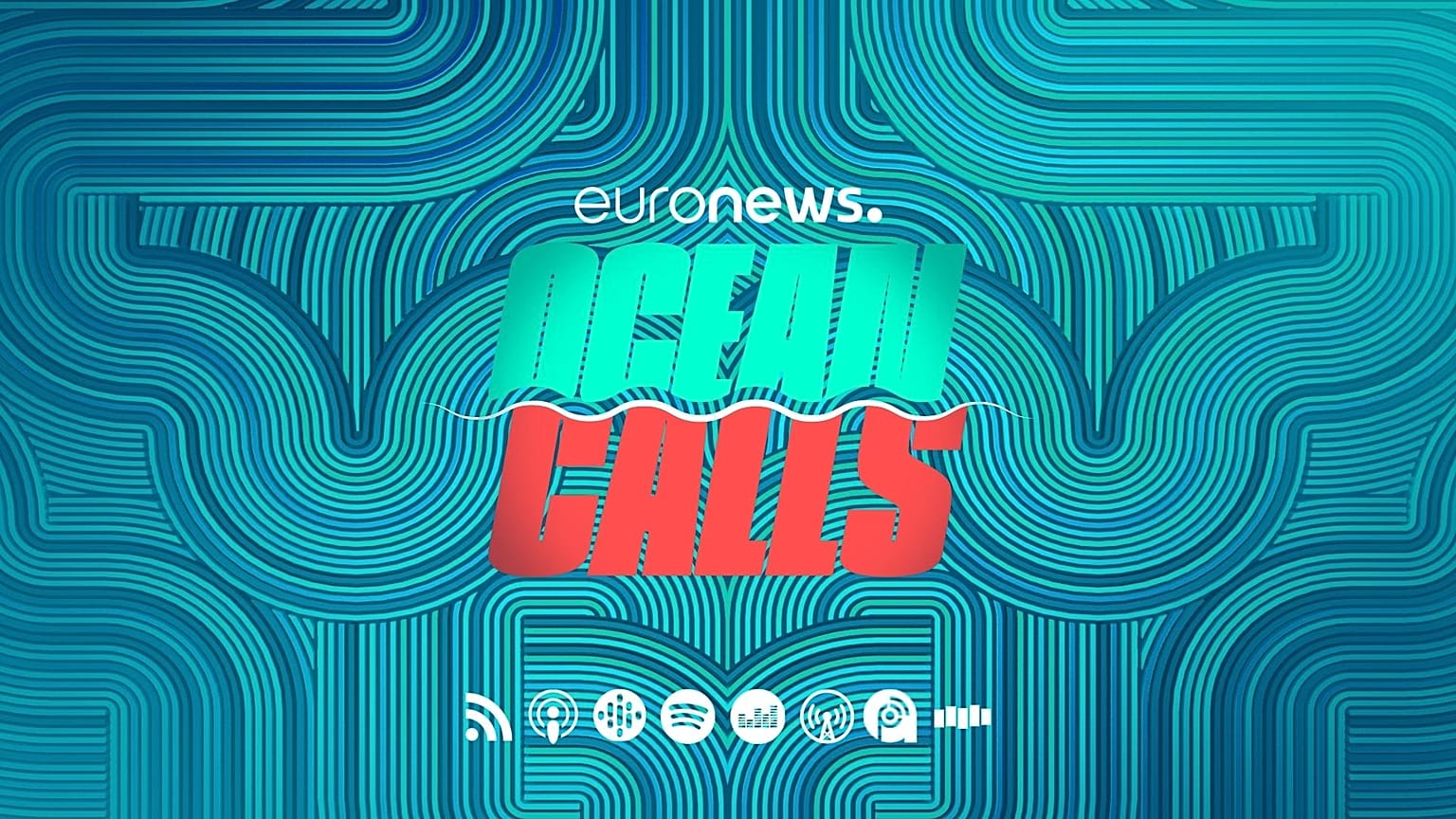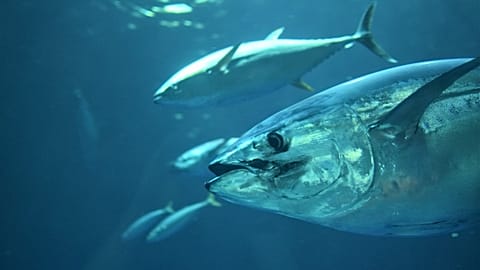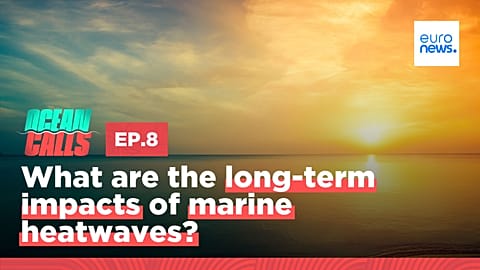Ocean Calls is making a comeback with a new season premiering on March 2nd. Get ready to plunge into a myriad of scintillating subjects, including underwater noise pollution, the future of sharks, and marine protected areas.
Ocean Calls returns for a new season on the 2nd of March, and we're diving back into more hot topics, like underwater noise pollution, the future of sharks, and marine protected areas.
 ADVERTISEMENT
ADVERTISEMENT
 ADVERTISEMENT
ADVERTISEMENT
Hear more answers to difficult questions, more debate and more celebrity ocean stories.
In each 30-minute episode we debate the issues making waves on our blue planet with renowned ocean experts.
Euronews science reporter Jeremy Wilks hosts the podcast, scuppering the myths, navigating the tricky questions and sailing through the jargon to deliver insights into the most significant stories in the ocean environment.
After the serious debate you can also sit back and hear passionate people from the worlds of cinema, music and even space talking about their favourite marine species and ocean experiences.
Listen to all Ocean Calls episodes
15. What's the future of Europe's young fishers?
Fishing is believed to be one of the oldest professions in the world, with evidence of this activity dating back to prehistoric times.
According to the European Commission, in 2018 more than 150,000 people worked in the fishing industry in the European Union, but this number is declining.
An ageing workforce, lack of investment, safety concerns, and sustainability challenges are just some of the difficulties that this sector is facing.
In this episode, Euronews science reporter, Jeremy Wilks, discusses the future of European fishing communities with Anna Carlson, Fishery Officer for Socio-economic Issues at the Food and Agriculture Organisation of the UN and the General Fisheries Commission for the Mediterranean.
Our second guest is Esben Sverdrup-Jensen, President of the European Association of Fish Producers Organisations.
And at the end of the episode, Captain Peter Hammarstedt, the Director of Campaigns for Sea Shepherd, shares a personal and moving story of saving a pilot whale.
Thanks to Melvin van der Niet and Ton van Duijn from the STC scheepvaart en transport college, in Katwijk aan Zee in the Netherlands, and to Vicente Alfonso, from Gandia in Valencia, Spain, for talking to us about their experience as fishermen.
14. Are underwater cables safe?
Most of our internet traffic – our WhatsApp chats, Netflix, TikToks, Zoom calls, and this podcast, are recorded through a handful of undersea cables that are only 25 mm in diameter.
The media loves telling stories about how one country could steal data from their adversary or cut their web connection altogether by attacking undersea cables. But how true are these claims?
How safe are the undersea cables? Can our internet access be severed and what happens then?
In this episode, Jeremy Wilks is joined by Nicole Starosielski, associate professor of Media, Culture and Communication at New York University Steinhardt, author of the book, The Undersea Network, and Jonas Franken, a researcher in the field of Critical Infrastructure Protection & Maritime and Information Security at the Technical University Darmstadt in Germany.
At the end of the episode, you’ll hear about an incredible North Pole experience from a Spanish adventurer Nacho Dean, the first man to have walked around the world and swam between 5 continents.
13. Are marine heatwaves changing the Mediterranean forever?
The Med is getting heatstroke. From May to August last year, nearly the entire surface of the Mediterranean was hit by marine heatwaves. Why are the heatwaves happening, what's the impact on corals and fish, and can we do anything about it?
To discuss this troubling rise in temperatures, Euronews science reporter Jeremy Wilks is joined by Joachim Garrabou, Senior Researcher from the Spanish National Research Council and Emma Cebrian, a researcher at the Centre of Advanced Studies of Blanes in Spain.
And at the end of the episode renowned Swiss explorer and innovator, Bertrand Piccard, the first man to fly around the world in solar powered aircraft tells us a moving tale of his family's ocean exploits.
12. Are Marine Protected Areas working?
In theory, Marine Protected Areas (MPAs) allow us to protect the ocean from human activity, conserve nature, and support the local economy - a real win-win for everyone.
But many of them are criticised for being so-called 'paper parks' - meaning although they exist on government maps, in practice, there's little policing and destructive activities like trawling - which involves the use of huge net to collect everything in the water - are still allowed.
So, are Marine Protected Areas working, and what can we do to improve them?
Jeremy Wilks discusses this question with Joachim Claudet, a Senior Researcher and Ocean Advisor at French research organisation CNRS and Dr Purificació Canals, President of MedPAN, which is the network of Marine Protected Area managers in the Mediterranean.
At the end of the episode, you’ll hear from Ingrid Newkirk, the founder of People for the Ethical Treatment of Animals about a special ocean creature.
11. Should we eat wild or farmed salmon?
Salmon is a wonderful fish – not only is it delicious, but it’s also packed with nutrients. But the Atlantic salmon that we can find here in Europe is also an endangered species. So for us as consumers, what is a more sustainable choice: wild or farmed salmon?
To explore these questions, Euronews science reporter Jeremy Wilks is joined by Åsa Maria Espmark, a senior scientist specialising in fish welfare at Norwegian food research institute Nofima, and Ken Whelan, a senior advisor at the Atlantic Salmon Trust.
At the end of the episode you’ll hear from the Dutch DJ Armin van Buuren about his favourite ocean experience.
In this episode we used "Turn The World Into A Dancefloor”. Performed by Armin van Buuren. Courtesy of Armada Music B.V.
10. Should we worry about sharks?
Ever since the mindblowing success of “Jaws”, where sharks are portrayed as bloodthirsty vengeful human-killers, people have been scared of these large marine predators.
But scientists believe that these magnificent animals deserve our attention. Many species of shark are in danger because of human activity and we really need them for our ecosystems to survive and thrive.
So, should we change our way of thinking about sharks? Should we care and protect them more than we do?
To discuss this issue, Euronews science reporter Jeremy Wilks is joined by two guests: Dr Iris Ziegler from the conservation organisation Sharkproject and Javier Garat Pérez, the president of Europêche, a representative body for the fishing industry in the European Union.
And at the end of the episode, you will hear from the Australian diver and filmmaker Madison Stewart about her favourite ocean animal – or favourite ocean experience. What will they be?
9. What’s changing as Greenland melts?
Greenland is changing before our eyes, with the rapidly-melting ice meaning tuna and dolphin are populating its waters and new weather patterns are spreading along its coasts. We explore what's happening in Greenland and what it means for you and me.
In the first episode of the second season of Ocean Calls, Euronews science reporter Jeremy Wilks discusses the effects of climate change on Greenland with glaciologist Sofia Ribeiro from the Geological Survey of Denmark and Greenland and marine biologist Mads Peter Heide-Jørgensen, Professor at the Greenland Institute of Natural Resources.
Our special guest at the end of the episode is endurance swimmer and UN Patron of the Oceans Lewis Pugh, who gives us the inside story on his very special Arctic swim.
8. Can we restore our oceans?
Coral reefs are one of the richest ecosystems on Earth, home to a quarter of all marine life. They also protect communities on land from the sea and offer an invaluable source of food.
But these ecosystems are dying because of pollution, overfishing, and the effects of climate change. And if the corals die, so will many other animals that depend on them.
What can be done? Can we repair the damage? Can these and other precious ecosystems like sea grasses and mangroves not only be preserved, but also actively restored?
To answer these questions we speak with Prof Carlos Duarte, Executive Director of the Coral Research & Development Accelerator Platform (CORDAP), and with an ocean acidification expert and IPCC contributor, Prof Jean-Pierre Gattuso, also research director at the Laboratoire d'Océanographie de Villefranche-sur-Mer.
And at the end of the episode you’ll hear from Mission Blue founder, legendary oceanographer, and pioneer in the use of modern scuba gear, Sylvia Earle.
7. What's the future of ocean energy?
The steady swell of the waves, the powerful tug of the tides and the driving force of the wind are natural forces that have great potential to power our lives if we can harness them to generate electricity. Ocean energy alone could generate equivalent to 10% of Europe's electricity demand by 2050.
But how will it work? And what are the consequences?
In this episode, we discuss these questions with two experts in the field - Britta Schaffmeister, CEO of the Dutch Marine Energy Centre, and WWF European ocean policy officer Helena Rodrigues.
And at the end of the episode, Brazilian big wave surfer Maya Gabeira will tell a touching tale about one of our planet's most fascinating species.
6. Can we protect our high seas?
The ocean makes up 70% of our planet’s surface and yet there’s no comprehensive framework to govern things like resource extraction and conservation in the high seas.
In this episode, we discuss a deal that has been on the United Nations' table for over 20 years and needs an agreement on how to protect and manage areas beyond national jurisdiction. Can we agree on how to govern our seas? To answer this and many other questions, we invited two experts: Alice Vadrot, a political scientist specialising in environmental policies at the University of Vienna, and Julian Jackson, head of the Pew Charitable Trusts European Campaign to protect ocean life on the high seas.
At the end of this episode, you’ll hear an incredible story from a Norwegian football player and environmental activist Morten Thorsby about his favourite marine animal.
5. Illegal fishing: Who is responsible?
Devastating economic damage, loss of biodiversity, slavery and violating human rights: illegal fishing is a serious criminal offence that is almost impossible to regulate.
In this episode, Euronews science reporter Jeremy Wilks asks investigative journalist Ian Urbina and marine biologist, Dr. Daniel Pauly, what impact illegal fishing is having on our lives and what can be done to stop it.
At the end of the episode, you will hear from aerial photographer George Steinmetz about his time spent on a squid boat in the South Atlantic.
4. Is it possible to end ocean plastic pollution?
There’s so much plastic in our seas that we may leave behind a layer of plastic for future archaeologists to study. What can be done to clean up our oceans?
In this episode, Euronews science reporter Jeremy Wilks discusses plastic pollution with Pennie Lindeque from Plymouth Marine Laboratory and Francois Galgani from Ifremer. You'll also hear activist Alexandra Cousteau talk about her favourite marine animal. You won't believe what it is.
3. Deep-sea mining: solution or environmental disaster?
The promise of deep-sea mining is to deliver the rare metals we need for the green energy revolution but it may cause pristine and largely unexplored habitats to be depleted and damaged forever.
In this episode, Euronews science reporter Jeremy Wilks discusses the topic of deep sea mining, an emerging industry that is dividing scientists, governments and industry. His guests are Renee Grogan, the Director of Sustainability at Impossible Mining and deep-sea habitat specialist Dr Pedro Ribeiro. WWF expert Jessica Battle also gives herinsight on this hotly-debated sector.
And ESA astronaut Luca Parmitano recounts the moment he came eye to eye with his favourite marine animal.
2. Is it OK to eat fish if you love the ocean?
Certified organic, dolphin-safe, line caught, or MSC certified? The labels on fish products being sold in Europe can be confusing, so how do you decide which is the most sustainable choice?
In this episode of Ocean Calls we're fishing for the real story behind those labels on packaging and marketing slogans. Euronews science reporter Jeremy Wilks asks Manuel Barange, the director of the United Nations’s Fisheries and Aquaculture Division at the Food and Agriculture Organization, and Vanya Vulperhorst, the European campaign director for Illegal Fishing and Transparency at the conservation organisation Oceana, if it's OK to eat fish if you love the ocean?
Oscar-winning documentary director and self-confessed 'Antarctica addict' Luc Jacquet also tells us about his favourite marine species.
1. Is it too late to save the ocean?
Overfishing, ocean acidification, and sea-level rise are hurting our oceans. Our blue planet is sailing into troubled waters, but is there still time to change course?
In this episode, we ask Swedish climate scientist Prof. Johan Rockström and British environmental activist George Monbiot if it's too late to save the ocean.
And Dr. Jane Goodall DBE tells us about her favourite marine species.
Ocean Calls is a message in a bottle from sea lovers at Euronews to ocean fans around the world. Subscribe to Ocean Calls on your favourite podcast app, or find it on euronews.com.
Created in partnership with the European Commission's Directorate-General for Maritime Affairs and Fisheries.























